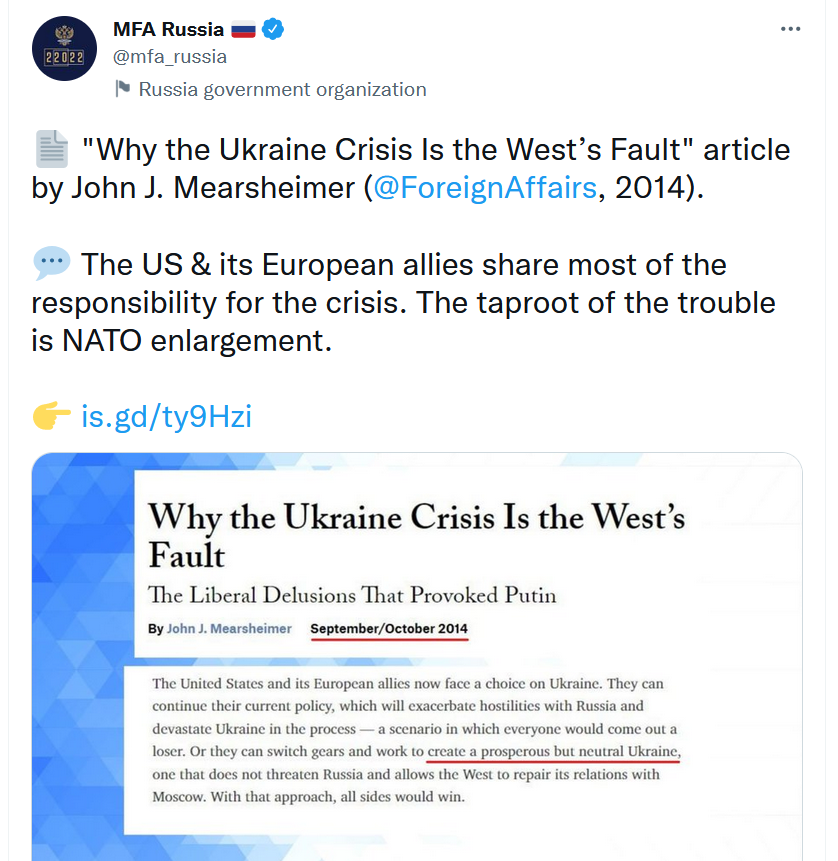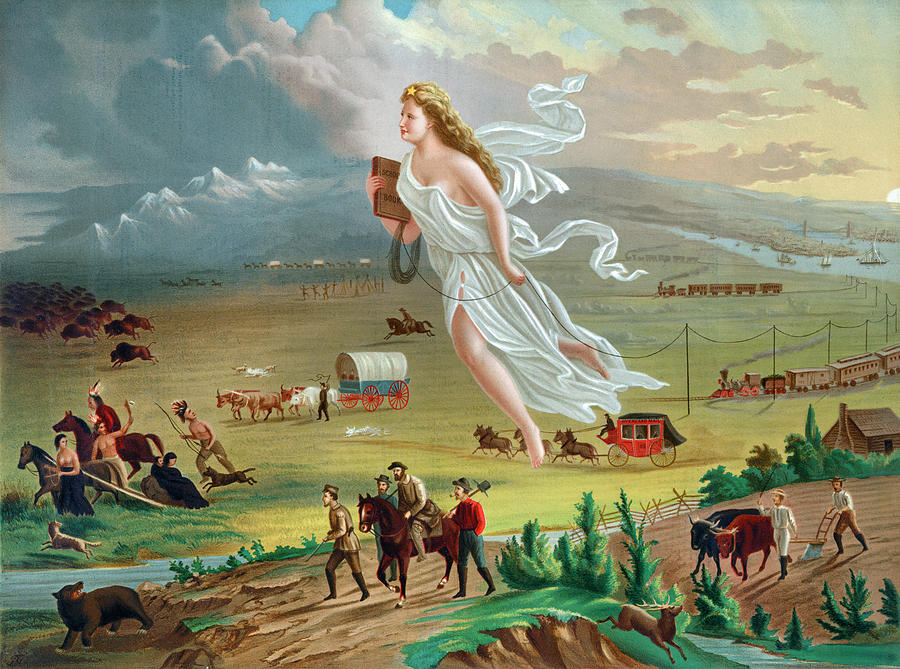Thread
I disagree with John Mearsheimer on the causes of the Ukraine-Russian War.
Instead, I think...and stay with me on this one... Offensive Realism offers a better explanation.
[THREAD]
Instead, I think...and stay with me on this one... Offensive Realism offers a better explanation.
[THREAD]
This is going to be a LONG thread (with lots of links to other threads). In it, I want to:
- Recap John's argument
- Share where I agree with it
- Share where I disagree with it
- Show that Offensive Realism offers a better explanation
- Recap John's argument
- Share where I agree with it
- Share where I disagree with it
- Show that Offensive Realism offers a better explanation
To begin, let's recap Mearsheimer's argument on the causes of the Ukraine-Russian War.
He has long argued, such as in this 2014 @ForeignAffairs piece, that the "the West/NATO/USA" created the crisis in Ukraine by pushing the eastern expansion of NATO (and the EU) after the Cold War.
www.foreignaffairs.com/articles/russia-fsu/2014-08-18/why-ukraine-crisis-west-s-fault
www.foreignaffairs.com/articles/russia-fsu/2014-08-18/why-ukraine-crisis-west-s-fault
He claims that since NATO/EU are dominated by USA/W. Europe, and (particularly w/ NATO) were formed primarily to counter the USSR during the Cold War, Russia is going to be angry by them encroaching on its neighborhood (i.e. former Soviet Republics)
www.youtube.com/watch?v=3ZV97GUdHzA
www.youtube.com/watch?v=3ZV97GUdHzA
Russia was too weak in 2004 to keep the Baltic States out of NATO and the EU. But Russia drew a hard line when NATO declared, at the Bucharest NATO Summit in 2008, that Georgia and Ukraine would eventually become members.
See paragraph 23 of 👇
www.nato.int/cps/en/natolive/official_texts_8443.htm
See paragraph 23 of 👇
www.nato.int/cps/en/natolive/official_texts_8443.htm
Just this past week, in an interview with @IChotiner in @NewYorker, John held firm to this argument.
www.newyorker.com/news/q-and-a/why-john-mearsheimer-blames-the-us-for-the-crisis-in-ukraine
www.newyorker.com/news/q-and-a/why-john-mearsheimer-blames-the-us-for-the-crisis-in-ukraine
Having laid out his argument (and why it matters), do I agree with any of it?
Yes, I agree with some key parts of it.
Yes, I agree with some key parts of it.
I agree that Russian officials made clear, even back in the 1990s, that expanding NATO eastward would be viewed as provocative to Russia
Indeed, key US officials shared this view
I agree that Russia's invasion of Georgia in 2008 can be linked to the Bucharest declaration (which @KofmanMichael in @WarOnTheRocks labeled a "redline" for Russia)...
warontherocks.com/2018/08/the-august-war-ten-years-on-a-retrospective-on-the-russo-georgian-war/
warontherocks.com/2018/08/the-august-war-ten-years-on-a-retrospective-on-the-russo-georgian-war/
...and that Russia's taking of Crimea in 2014 can be linked to the end of the Euromaidan Revolution in Ukraine.
www.brookings.edu/blog/order-from-chaos/2020/03/17/crimea-six-years-after-illegal-annexation/
www.brookings.edu/blog/order-from-chaos/2020/03/17/crimea-six-years-after-illegal-annexation/
Finally, I like that John's argument takes seriously the point made long ago by Bob Jervis that while states might view their own actions as benign (i.e. "hey, NATO expansion is good, right?"), others will not perceive them that way.
That is where I agree with Mearsheimer.
Where do I disagree? I disagree on some key points.
Where do I disagree? I disagree on some key points.
First, his argument takes away the agency of the Eastern European states.
As I argued in this thread (which I already linked to a few times above)...
As I argued in this thread (which I already linked to a few times above)...
...eastern expansion of NATO was far from "imposed" or even "pushed" by the United States or NATO. It was desired by the Eastern Europeans (we'll come back to this).
In fact, THEY often had to take measures to PUSH the USA/NATO, not the other way around.
In fact, THEY often had to take measures to PUSH the USA/NATO, not the other way around.
Second, as I showed in this thread...
...scholars and analysts have LONG viewed Ukraine-Russia relations as holding the greatest potential for conflict in post-Cold War Europe.
Such views well predate NATO expansion.
Such views well predate NATO expansion.
Third, the argument downplays the imperialist views of Putin. As Putin has consistently made clear, he holds designs at recreating, at least portions of, the Russian/Soviet empire.
@zackbeauchamp offers a great summary in this @voxdotcom piece.
www.vox.com/policy-and-politics/2022/2/23/22945781/russia-ukraine-putin-speech-transcript-february-22...
@zackbeauchamp offers a great summary in this @voxdotcom piece.
www.vox.com/policy-and-politics/2022/2/23/22945781/russia-ukraine-putin-speech-transcript-february-22...
What these three points suggest to me is that, at most, NATO expansion exacerbated an already tense situation.
But it didn't CAUSE the situation to be tense or carry the potential for conflict.
But it didn't CAUSE the situation to be tense or carry the potential for conflict.
So if the Ukraine-Russian War is not caused by NATO expansion, then what explains it?
Given the above facts, I actually think a better explanation can be found in Mearsheimer's earlier work.
www.amazon.com/dp/B0022Q8CVY/ref=dp-kindle-redirect?_encoding=UTF8&btkr=1
Given the above facts, I actually think a better explanation can be found in Mearsheimer's earlier work.
www.amazon.com/dp/B0022Q8CVY/ref=dp-kindle-redirect?_encoding=UTF8&btkr=1
As Mearsheimer himself will acknowledge, the core ideas of Offensive Realism don't start with him. Indeed, they date back to World War I and the work of G. Lowes Dickinson
Dickinson, looking at the onset of World War I in Europe, put forward the argument that the war was caused by the inherent desire of states to seek supremacy over one another
Mearsheimer fleshed out key elements of Dickinson's claims, namely giving it a focus on regional domination.
According to his theory of Offensive Realism, the ideal situation for any country in international politics is that it dominates its region of the world and make sure that no other country dominates that region. This is the only way to safeguard their interests.
Mearsheimer's model for this theory is not Russia, but the United States. See Manifest Destiny + Monroe Doctrine
But Russia was eventually unable to sustain that regional dominance. It was willing, but not able. Maintaining the empire and domination of Warsaw pact countries proved too costly (in a variety of ways, including economic) to maintain.
journals.sagepub.com/doi/full/10.1016/j.euras.2012.07.003
journals.sagepub.com/doi/full/10.1016/j.euras.2012.07.003
But just because it stopped, doesn't mean that it couldn't start again. That is what offensive realism predicts and, more importantly, that is what many in the Eastern European countries feared.
online.ucpress.edu/cpcs/article-abstract/46/3/315/277/Continuity-and-change-in-Russia-s-policy-toward...
online.ucpress.edu/cpcs/article-abstract/46/3/315/277/Continuity-and-change-in-Russia-s-policy-toward...
That fear was grounded in official rhetoric from Russia, such as referring to its neighbors as the "near abroad"
www.tandfonline.com/doi/abs/10.1080/00396339408442751?journalCode=tsur20
www.tandfonline.com/doi/abs/10.1080/00396339408442751?journalCode=tsur20
So the states in Central and Eastern Europe, fully understanding that Russia would again seek regional dominance, wanted to safeguard their sovereignty and autonomy before it was too late.
The solution? Gain @NATO membership!
The solution? Gain @NATO membership!
As the above quote by Clinton from the 1990s makes clear, US officials understood the risk: Russia is going to seek dominance of the region again and expanding NATO eastward, especially into the Former Soviet Republics, could create a security risk for the USA.
But Article 5 of NATO -- the mutual defense clause -- is also a powerful deterrent: especially when coupled with actual force deployment.
That is why NATO has focused on its "Enhanced Forward Presence" over the past several years (cc @ALanoszka)
www.ndc.nato.int/news/news.php?icode=1504
That is why NATO has focused on its "Enhanced Forward Presence" over the past several years (cc @ALanoszka)
www.ndc.nato.int/news/news.php?icode=1504
What does this all mean? It means that if there is any faulting NATO, it is in not expanding NATO *fast enough* and *far enough*. Once the Baltics were in, bringing in Ukraine needed to follow.
@SeanDEhrlich made this point the other day
@SeanDEhrlich made this point the other day
In sum, Offensive Realism, as described by Mearsheimer in his "Tragedy of Great Power Politics", explains well Russia's behavior over the past century, including today: like all great powers, it seeks to dominate its region. That is ultimately the cause of the current war.
[END]
[END]
Addendum/Update: Seems Putin himself confirmed that Mearsheimer (2001) offers a better explanation for his behavior than Mearsheimer (2014)
www.washingtonpost.com/world/2022/06/10/russia-putin-peter-the-great-ukraine-war/
www.washingtonpost.com/world/2022/06/10/russia-putin-peter-the-great-ukraine-war/


